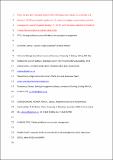Improving the application of long-term ecology in conservation and land management
Abstract
1. Significant effort is being made to develop more inclusive and systematic decision-making frameworks in ecology, but these have yet to include palaeoecology. Doing so would address critical questions about long-term ecological processes (spanning >50 years). 2. This paper outlines the main barriers to the integration of long-term ecological data (LTE) into management. Using two UK upland case studies, it uses a choice experiment to assess the value placed on LTE by ecological researchers, policymakers and practitioners. Respondents were able to consider how selecting or excluding different sources of evidence might affect management decisions and their environmental outcomes. 3. The results suggest that LTE has the potential to become a valued part of the evidence base for guiding land-management decisions. 4. Synthesis and applications. Placing more emphasis on site-based approaches can help translate this potential into practice by demonstrating the practical benefits of using LTE. By working with managers to address site-based issues, palaeoecology can provide additionalinsights into ecosystem dynamics and critical thresholds. Using LTE can also improve conservation effectiveness by ensuring that both rapid and lagged responses are anticipated and indicating the range of variability against which management responses can be evaluated.
Citation
Davies , A L , Colombo , S & Hanley , N D 2014 , ' Improving the application of long-term ecology in conservation and land management ' , Journal of Applied Ecology , vol. 51 , no. 1 , pp. 63-70 . https://doi.org/10.1111/1365-2664.12163
Publication
Journal of Applied Ecology
Status
Peer reviewed
ISSN
0021-8901Type
Journal article
Description
This research was funded by the Economic and Social Research Council through the Rural Economy and Land-Use Programme (RES-229-27-0003).Collections
Items in the St Andrews Research Repository are protected by copyright, with all rights reserved, unless otherwise indicated.

